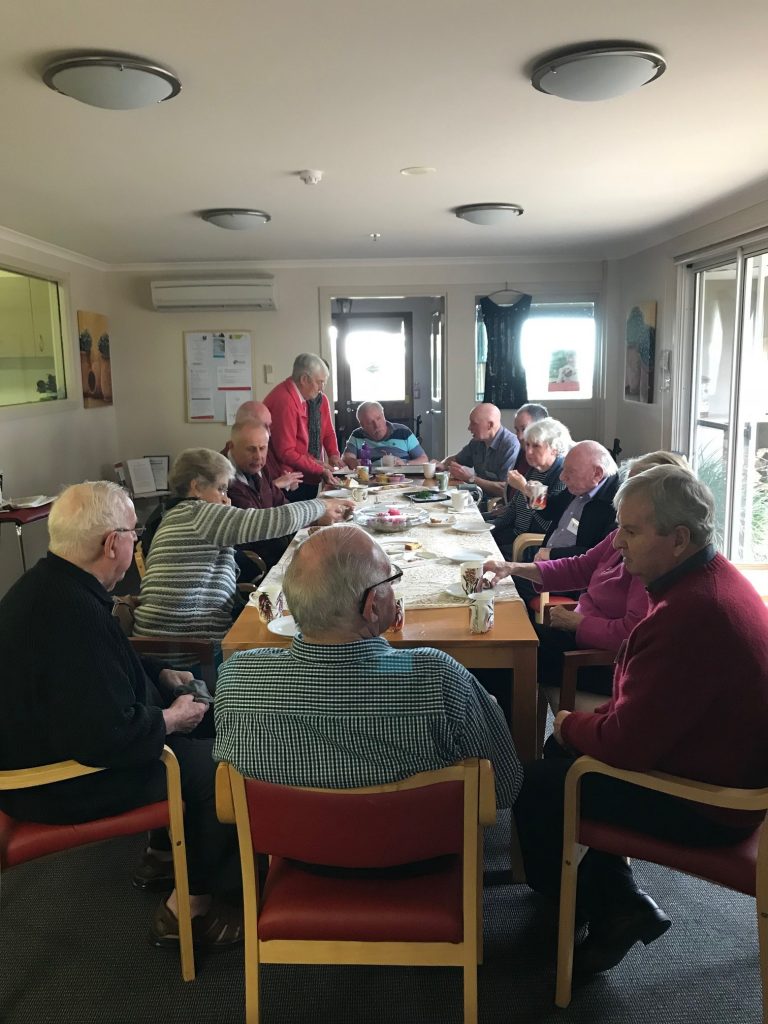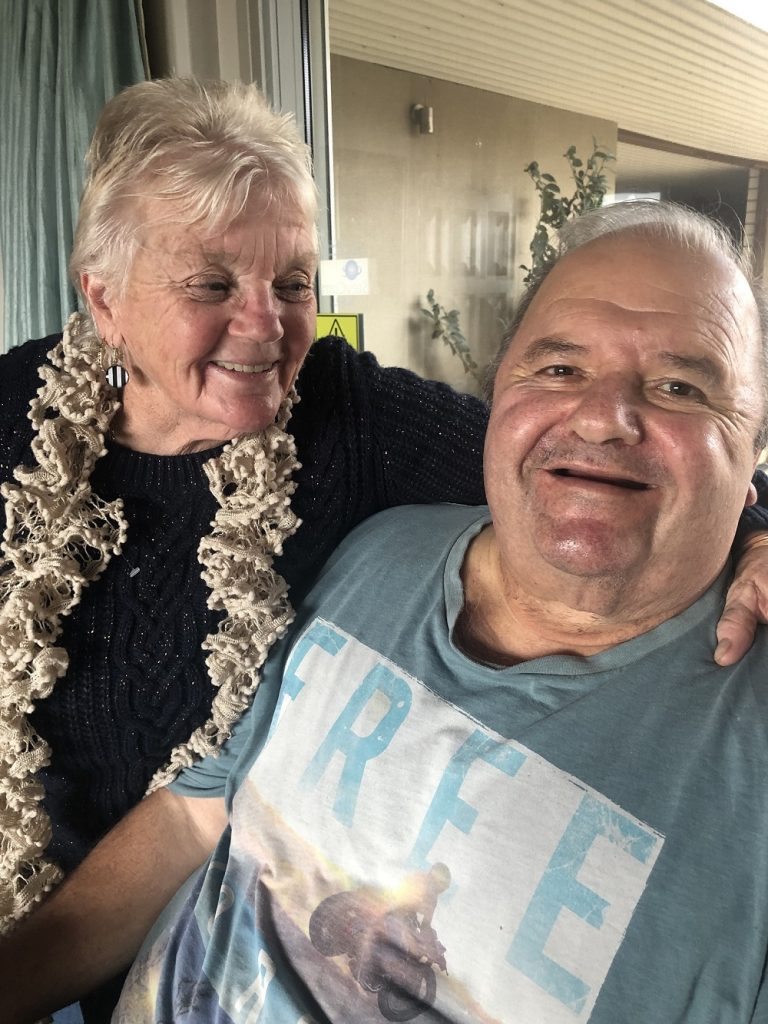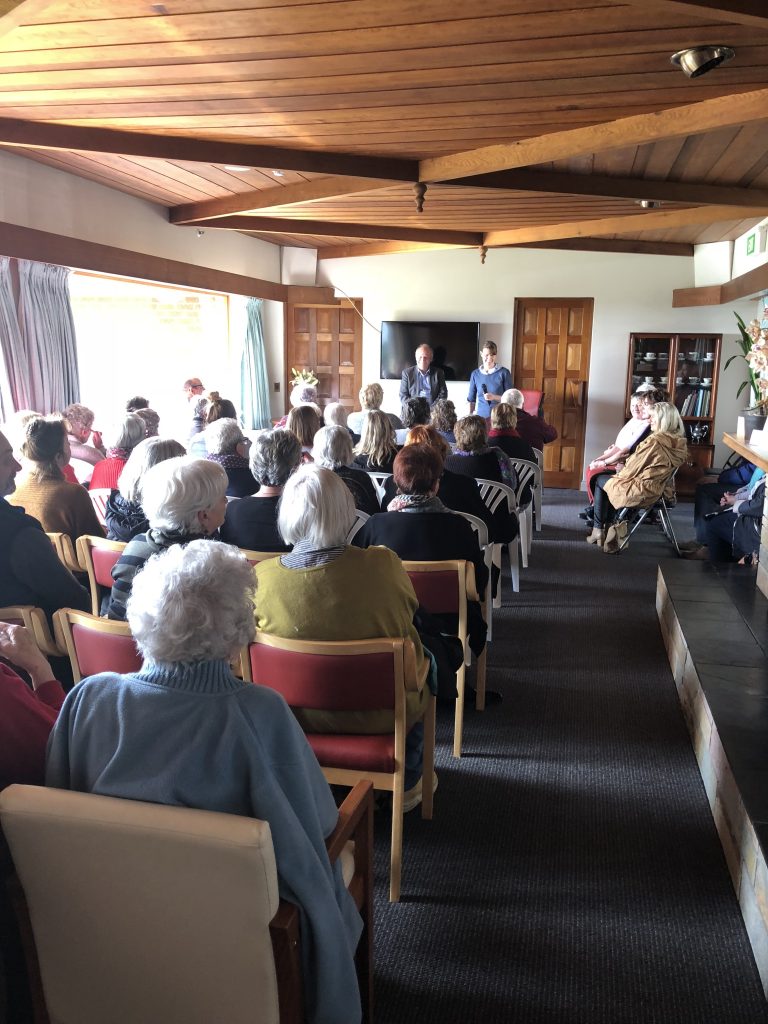Foundation for Rural & Regional Renewal (FRRR)
Anam Cara House Colac is a community owned hospice established to provide respite, palliative care and end of life care for the people of South West Victoria on Gulidjan Country. Carers, family and friends who support their chronically ill loved ones with at-home care commonly experience compassion fatigue when they are tasked with delivering the bulk of care requirements.
Supporting these carers, alongside improving the comfort of chronically ill community members, were the key drivers behind what Anam Cara House Colac aimed to achieve with their project. Community members who are either ill themselves or caring for others are often confused and/or unaware of available support services that could assist them to maintain their independence or live their lives more comfortably. For many, it is a time of vulnerability and fear, and having knowledge of, and access to, available services is critical.
Anam Cara House Colac received a $5,000 Gardiner Foundation Community Grant to run a series of three focused information sessions for community members living with, or caring for those affected by, life-limiting conditions.
Guest speakers from local health services, as well as a representative from My Aged Care, provided up-to-date and relevant information that is helpful and/or necessary to support someone with a chronic illness to live in a supported way that maximises independence. The choice of speakers was developed on the basis of anecdotal feedback from users of Anam Cara’s services.
Naomi Lettieri, Anam Cara’s Community Liaison Nurse, said that they experienced challenges with a slightly lower uptake than was expected, and they responded by involving the local radio station.
Anam Cara contacted Otway Community Radio (OCR), who agreed to record the second and third sessions. In doing so, they were able to reach more people, especially those who were unable to leave home due to their caring commitments. The sessions were aired both by OCR and shared on Anam Cara’s Facebook page as a podcast.
The grant covered the costs of advertising, catering, resources, and provision of respite to those who require it, with a portion directed to wages for planning and implementation of the events. It also included follow up for those in need, whether it be with advance care planning support or assistance in referral to other services.
Thanks to Anam Cara House Colac and the generosity of the Gardiner Dairy Foundation, this project allowed those in need to access information on caring for either themselves or those with chronic illness.
Capacity building grants support long-term recovery initiatives of local not-for-profits and community organisations
FRRR has awarded grants to four Victorian community groups playing a central role in the long-term recovery of communities impacted by the 2019/20 bushfires.
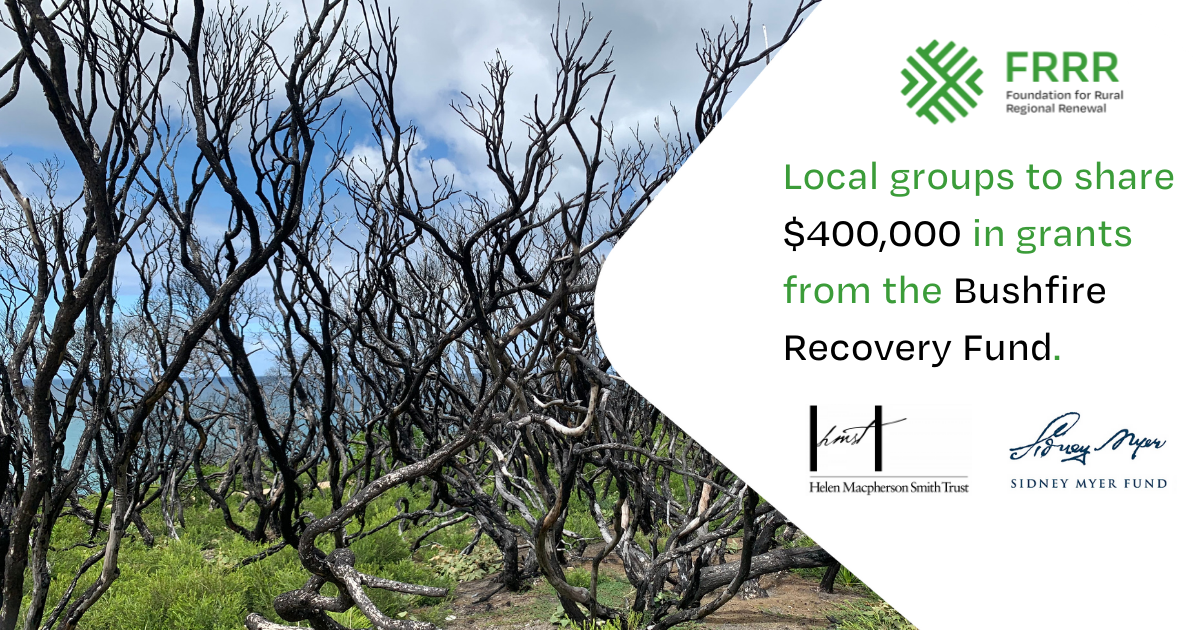
The grants are the first to be awarded through the Bushfire Recovery Fund established thanks to a multi-year partnership with the Helen Macpherson Smith Trust (HMSTrust) and the Sidney Myer Fund. The program is designed to strengthen the capacity of local not-for-profit organisations and community groups operating in fire-affected areas to support the ongoing recovery of communities.
Natalie Egleton, CEO of FRRR, said that having access to longer-term, multi-year support is vital when it comes to creating effective solutions on the ground to allow these communities to recover and thrive.
“These grants recognise the vital role of these organisations and invest in the skills, tools and resources they need to support their community as they rebuild, and to sustain their work beyond the recovery. With the additional pressure of COVID-19, this multi-year support will mean they can confidently plan, invest and be there to support their community as needs change,” Ms Egleton said.
HMSTrust CEO, Debra Morgan, said that the Trust believes local organisations are best placed to understand local needs, and that this is particularly the case in bushfire-affected areas, where it’s critical that organisations have the support they need to sustain their operations.
“The four organisations have identified the needs specific to their communities, and each has a unique approach to the road to recovery. The projects reflect the local context of each community and the interventions required for long-term recovery. We are pleased to support these strong organisations seeking to build organisational capacity and resilience, and we hope they will serve to strengthen the communities into the future,” Ms Morgan said.
Sidney Myer Fund CEO, Leonard Vary, said that the Bushfire Recovery Fund aims to strengthen the operations of ‘backbone’ organisations and give each the means to implement effective and innovative approaches in supporting impacted communities over the longer term.
“Local organisations must be given the tools to develop and implement plans for sustainability and growth so as to support bushfire-affected communities into the future. These grants will help enhance organisational capability and improve the services offered to communities including future preparedness efforts,” said Mr Vary.
The four groups funded are:
- Alpine Valley Community Leadership (AVCL) – $90,000 – Build AVCL’s capacity to strategically plan and deliver leadership training that can more effectively support and build community recovery capacity in north-east Victoria.
- Corryong Neighbourhood House Inc – $103,340 – Increase operational capacity by providing an additional .8 FTE to the core staffing levels. The increased resource will enable Corryong Neighbourhood House Inc to continue to progress its strategic social enterprise and community development work including participation in bushfire recovery work.
- Mallacoota Community Health Infrastructure and Resilience Fund Inc (CHIRF) – $113,230 – Enable the employment of a skilled local project manager, who will progress the current aims for developing the local mental health services offering through strategic planning, fundraising and project design and development.
- Mount Beauty Neighbourhood Centre (MBNC) – $100,000 – Increase operational capacity of the organisation, which will allow it to develop a prepared and resilient community. The driving force behind this application is the volunteer-run Keep Calm Committee, which works alongside MBNC.
More information about the Bushfire Recovery Fund is on this website.
Unlike most other youth music programs, CRASHENDO! Bairnsdale is not only about the tunes. Modelled after Venezuela’s National System of Youth and Children’s Orchestras and Choirs El Sistema Global, CRASHENDO! uses music education as a vehicle to help children develop their self-esteem, resilience, and social skills.
To support the purchase of new instruments and to help cover tuition fees, the CRASHENDO! team successfully applied to FRRR’s Strengthening Rural Communities program, receiving a $10,000 grant funded by The William Buckland Foundation (managed by Equity Trustees).
They sent us a detailed plan outlining how they planned to use the funds over the course of two years, and how excited they were to get on with their music classes, events, and other activities.
What they couldn’t have known, however, was that the years that followed – 2019-2020 – would be some of the most challenging years their community had ever experienced.
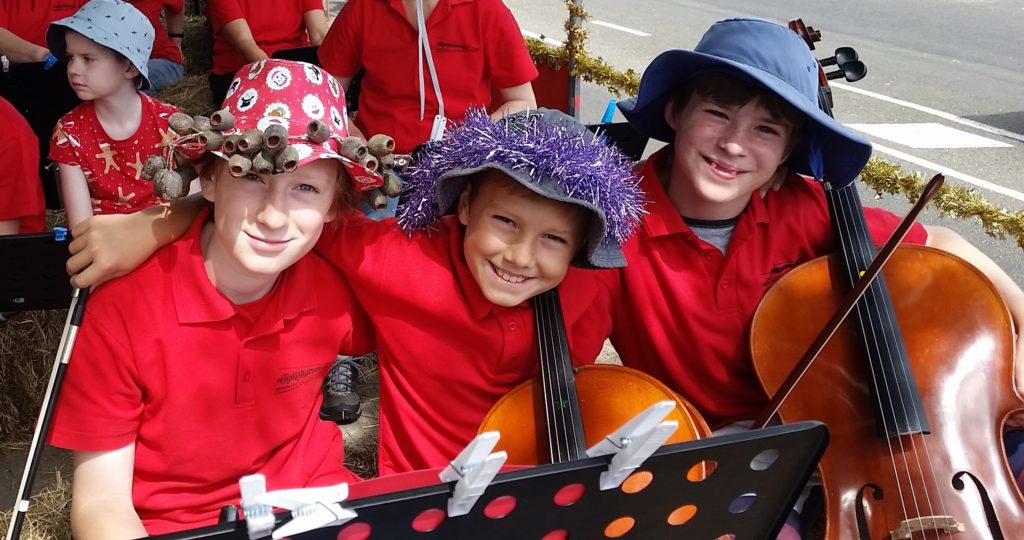
The CRASHENDO! program, which supports around 120 children in Bairnsdale and surrounds, had a great start to the year in 2019, with in-schools tuition, pre-orchestral, orchestra and early years programs in full swing. They also hosted several special events such as the Latrobe Orchestra Workshop and the Christmas Street Parade, both of which brought much joy to the community.
But as Christmas drew closer, so did the devastating bushfires that were already tearing through parts of NSW and VIC. And when the semester was set to begin again in the new year, the CRASHENDO! students had no school to return to.
The facilities, including all their instruments, were destroyed in the fires. Several families in the community had also lost their homes.
But despite these unimaginable challenges, children and tutors alike demonstrated once again the resilience and fighting community spirit we so often see in rural and regional Australia. The classes were moved to another school, and the children found some relief in returning to something familiar and normal – their music practice.
With support from their wonderful and engaging tutors, and by working together in groups, the children continued to develop both their musical skills and interpersonal skills.
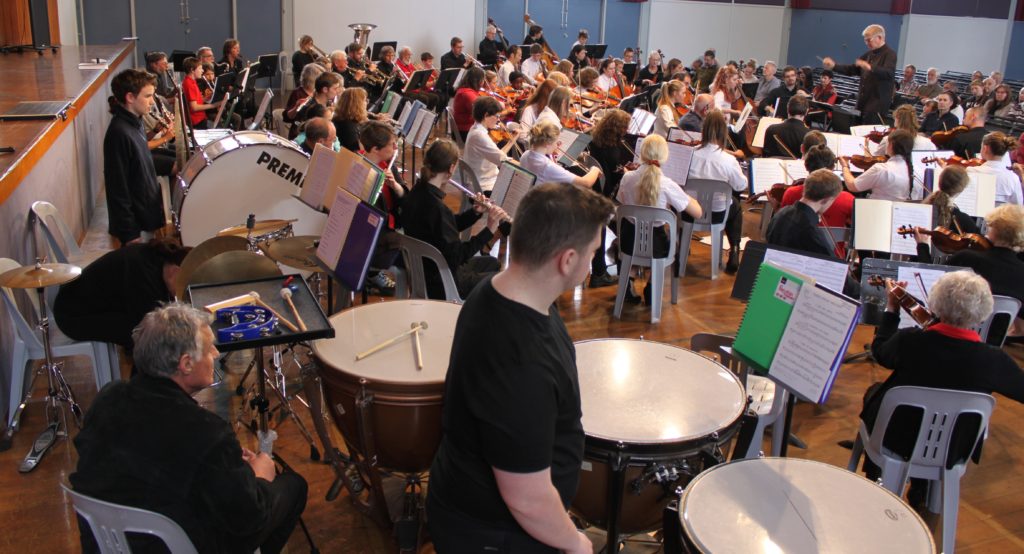
But as we all know too well, 2020 brought with it its own set of challenges.
Soon after the COVID-19 virus reached Australian shores, life for the Bairnsdale community was once again turned upside-down. The community went through two remote learning periods (April – June and July – September), which meant all programs had to be moved online.
During this those unusual times, CRASHENDO! Bairnsdale Youth(ful) Orchestra (CBYO) reduced their sessions, halted expansion plans, and cancelled concerts and community performances.
The future was looking uncertain and bleak. But the CRASHENDO! team – both children and staff – were not about to give up that easily. They already knew the strength they had within them, especially when working together, so they kept their heads high, their Zoom cameras on and their smiles BIG – as they found new and engaging ways of delivering their programs.
Instead of having concerts, they produced videos. Instead of cancelling all Special Events, they scaled down the delivery time and incorporated video compilations. The creativity was flowing and proved to be a great learning experience across the board.
Watch a clip from the adorable video performance here.
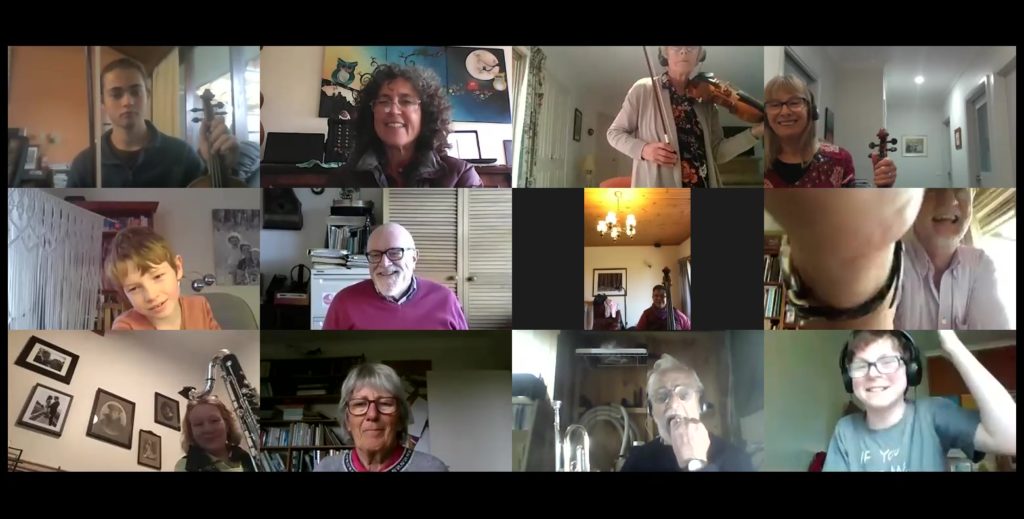
“Although extremely challenging we have been extremely excited about the opportunity to learn new ways of delivering programs, administration and promotion,” Hilary Rigg, Crashendo! Bairnsdale Coordinator said.
She explained that while the number of participants decreased during online delivery, it also allowed them to widen the scope of musical styles and instruments on offer in the program, as well as the geographic area in which participants lived (across wider Gippsland and Melbourne). As tutors could dial in from anywhere, CRASHENDO! also grew their pool of highly skilled tutors, from areas including Melbourne, Geelong and even interstate.
“We have widened networks, forged new or deeper collaborations with other local musical groups and personnel, and kept musicians connected and playing. Hence, most importantly contributing to the well-being of our community!”
Hilary Rigg, Crashendo! Bairnsdale Coordinator
For the residents of Coragulac and its surrounding communities, having access to excellent early childhood education with the right facilities is a top priority for local families.
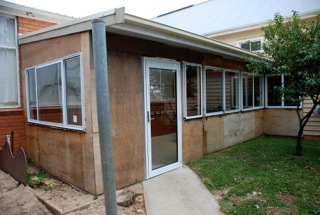
The Coragulac & District Kindergarten has provided care and education for their small community for many years. The facility’s three staff and local volunteers run a three-year-old program for 21 children, and a four-year-old program for 20 children.
Play-based learning helps to develop coordination, motor skills and problem solving skills, while focusing on social skills that are invaluable to kids, such as how to get along with their classmates, how to communicate and follow general rules. It also allows kids to follow their imagination and explore their interests.
The energy and imagination the kids bring to the kindergarten is endless, however their ability to play outside was often met by challenges due to weather, and between the scorching summer heat and chilly winter days, the kids weren’t able to enjoy being outside for very long.
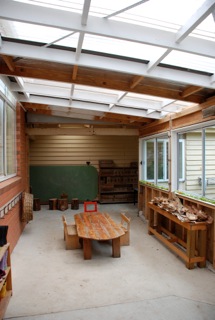
This made some play-based activities very difficult, as the kindergarten lacked a suitable area for things like pot planting and chalk drawing. To continue providing great childcare for local families, the kindergarten needed to upgrade their facilities.
The Kindergarten was awarded $5,000 through the Gardiner Dairy Foundation Community Grants program for their Sheltering Our Children for a Bright and Happy Future project, which built a new verandah for outdoor learning and activities.
The new space allows the kids to enjoy being outside without worrying about the weather, and provides an area for ‘messy’ play-based learning. In addition to the kids who attend the kindergarten during the week, the space is also used after school and on the weekends by families with school-aged children and children with disabilities, as it provides a sheltered, fenced and safe play space.
Daylesford is around 105 km north west of Melbourne. Like any small town, some children struggle with certain aspects of their learning, which can have a significant impact on their mental health and wellbeing. Following an assessment of student literacy skills, the Daylesford Primary School identified a number of children whose reading was below the expected literacy standard. To support these students, they implemented a research-based one-on-one initiative to develop their students’ reading and comprehension capacity outside of the regular curriculum.
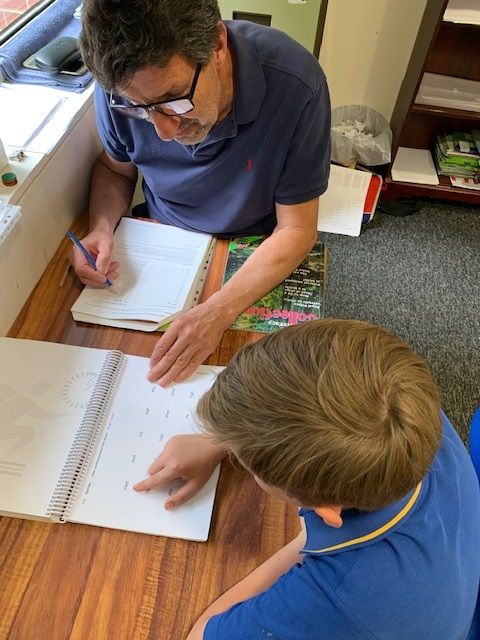
The MultiLit (Making Up Lost Time in Literacy) program also seeks to build self-esteem and confidence. The School first received an FRRR grant for this program in 2013 and saw significant improvements in the children. The program has attracted regular support ever since, including a Tailored Grant this year for $25,000 that enabled another 18 students to participate in the program.
Once again, it delivered great results. One child started the year having to have text read to him. By year’s end, he was reading independently. Trevor Edwards, Principal of Daylesford Primary at the time, explained that the learning confidence gained by these children had transferred into other areas of study.
“We are most proud of the fact that we not only provide a highly effective and individualised learning program but an environment where students’ wellbeing, self-esteem and confidence is enhanced and nurtured. “The most challenging component is determining who can participate in the program, as there are many students who need this individual assistance. We prioritise and support those children with additional reading needs, but the generous funding has everlasting impact.”
Did you know that one of the best ways to measure the health of a river is to look for microscopic water bugs? The Great Alpine Gallery has created the ‘Living River Water Bugs’ art installation along the Poets Walk at Tambo River to draw attention to these important little critters and engage the community in understanding how important they are.
When the Poets Walk was being updated for a relaunch, Gallery staff saw an opportunity to work with local artists and the local P-12 College to create an art installation that celebrated the micro bugs that make their river healthy.
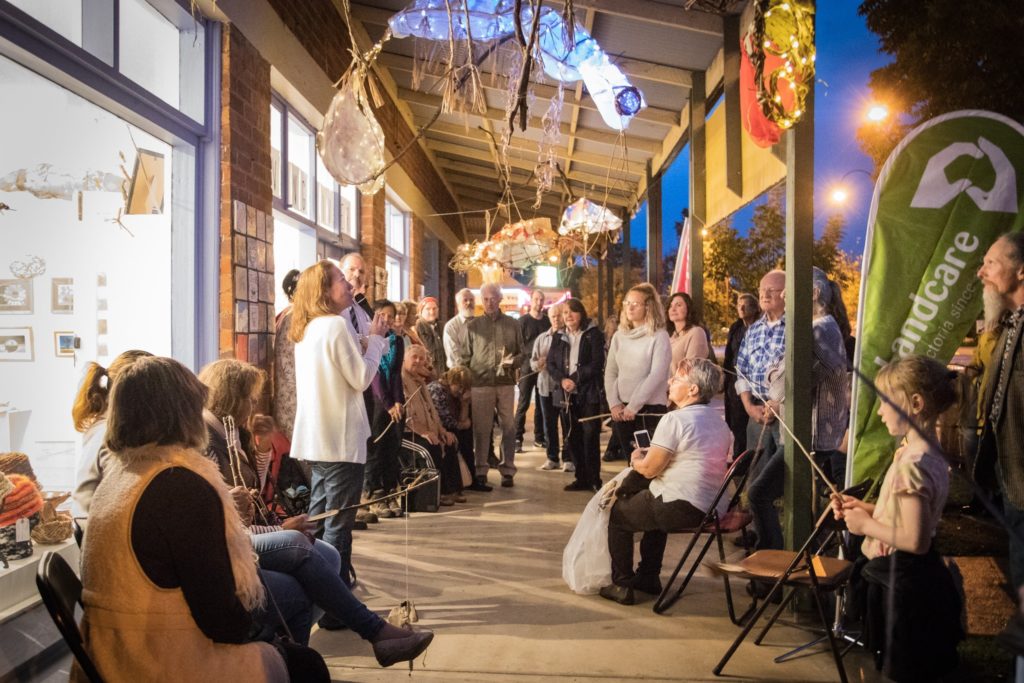
They also wanted to educate the town about the importance of making sure that the river water was clean and healthy. They hoped to engender community participation and ownership in keeping the river free of agricultural chemicals and other pollutants. This is particularly important for people to understand as agriculture is a major industry in the community.
A $5,000 grant from the William Buckland Foundation and Equity Trustees meant that the Gallery could commission artworks from nine local artists, with a mixture of established and emerging artists working together to create the installations. This created an opportunity for mentoring for emerging artists in the community.
Local school students took water samples from the river and identified the water bugs as part of their science program, and then gave this information to the artists. They worked together to design and create the water bug installations, using a combination of basket weaving techniques with local sourced materials, eco dyed fabrics and other sustainable resources that are native in the community. 70 local community members also engaged in workshops to learn more about the importance of river-care and help to create the sculptures.
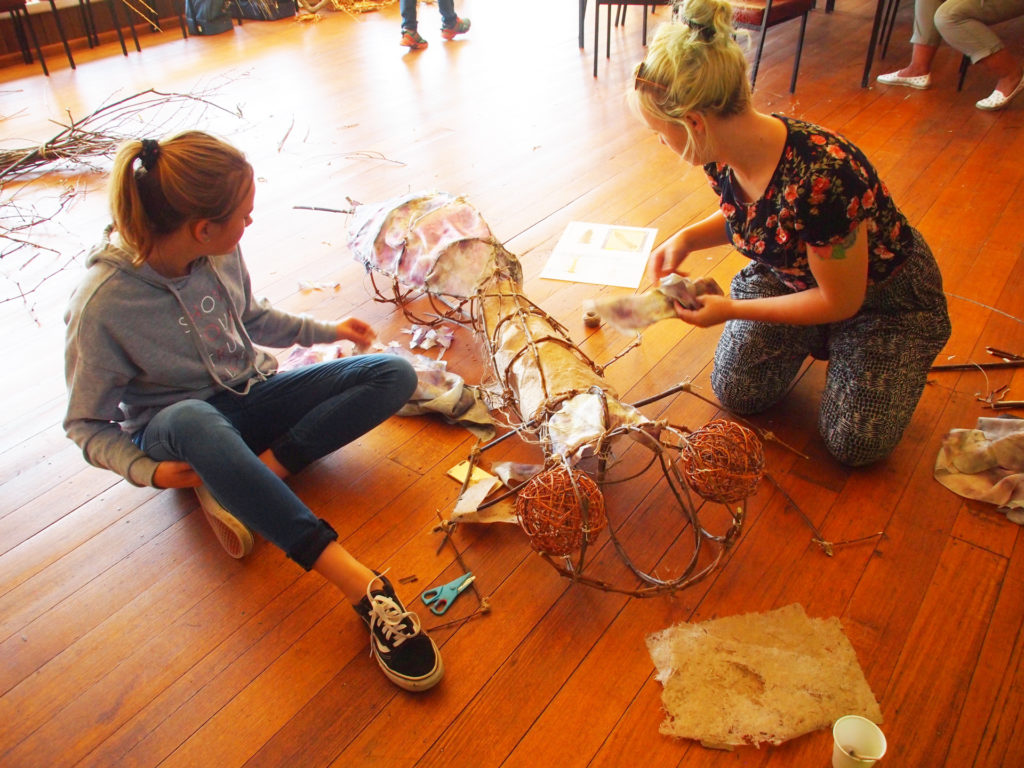
Heavy, and desperately needed, rain was forecast for the night of the launch, so the bugs were lit up and displayed in the gallery space. A river soundscape was played and a sideshow of photographs from the river were shown.
Tracey Johnson, President of the Great Alpine Gallery, said of the project;
“Living River Water Bugs has raised river-care awareness among the community. The engagement of the community in the joyous and fun-filled occasion of the launch was one of our proudest moments, along with raising awareness of the Poets Walk among the community as a wonderful asset they can enjoy now and in the coming years.”
Merrigum Primary School is a rural Victorian primary school with a small number of staff and students. The school is committed to building school capacity to provide students with educational opportunities through enhanced, personalised learning.
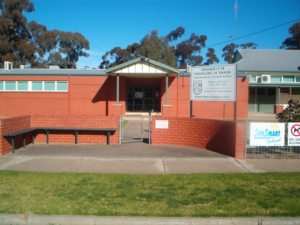
Many Merrigum Primary Students come from diverse backgrounds and some require additional learning support – something that the school community strives to provide them with. One of the areas where the school wanted to offer more support was music activities and education for the pupils.
In partnership with Merrigum Primary School, The Song Room, an organisation that delivers integrated music and art lessons in school delivered a six-month music program to students from Foundation to Year 6, working alongside their classroom teachers. The program was possible with thanks to a $7,500 REAPing Rewards grant.
Students greatly enjoyed the program and looked forward to their music lessons. Caitlyn Trotter, who led the program for students, told FRRR that the children responded well to all the activities.
“By the end of the lesson, they understood the basic (musical) terms. The children enjoyed being able to work together as a class and loved that they got to play an instrument as part of a song. This was always thoroughly enjoyed.”
This was reflected in the feedback from teachers, Belinda and Judi who reported that “The sessions were very well planned and built sequentially week after week to offer students the opportunity to develop skills at a targeted pace. The students had a lot of fun, and even some of the more reluctant musos were looking forward to class by the end of it.”
As part of the program, The Song Room also facilitated professional development lessons for the teachers, so that the music program could continue well beyond the formal end of The Song Room’s time at the school. Teachers were given lessons plans, games and instructions on how to facilitate music classes in a way that supports the current curriculum. Merrigum Primary School now also has ongoing access to more than 1,000 hours of online video resources from The Song Room to assist with planning and developing arts curriculum for students in the future.
Four rural health services in NSW and VIC awarded grants
The Foundation for Rural & Regional Renewal (FRRR) has awarded $368,768 in grants to four community health organisations in rural, regional and remote New South Wales and Victoria to enhance the primary and preventative health service offering in their communities.
Funded through the Enhancing Country Health Outcomes (ECHO) program, these grants will help to fill identified gaps in rural health workforce support and development, and the provision of accessible health care in areas where services are limited. Regions that are benefiting from these grants include the smaller communities surrounding the service centres of Nowra, Wagga Wagga, Armidale and Dubbo in NSW and Kerang, Wedderburn and Harrow in Victoria.
Natalie Egleton, CEO of FRRR, said that the ECHO program has provided insights into the various challenges facing health services in rural communities, and the continuing inequity of service access and provision.
“There’s a real need for flexible funding of community-based primary and preventative health services in rural communities, so it’s fantastic to be able to support local health initiatives through the ECHO program and help fill some of these gaps. Projects like Northern District Community Health’s place-based Rural Health Matters initiative will address health needs, health inequities and service provision gaps across several rural Victorian communities,” Ms Egleton said.
“There are also significant workforce shortages and limited access to upskilling and professional development opportunities for rural health services. We are pleased to be able to support the Cerebral Palsy Alliance in NSW and Harrow Bush Nursing Centre in Victoria. With these grants, these organisations can now undertake staff training and improve professional development opportunities throughout a number of rural communities.
“We are also pleased support an initiative lead by the Services for Australian Rural & Remote Allied Health, which will work with selected rural communities in both NSW and Victoria, helping communities to build their own capacity to attract and support a long-term rural workforce in their regions.
“This is the final round of the ECHO program, which was created thanks to a donation of just over $900,000 from Beyond Medical Education when they wound up. The program has highlighted the need for philanthropic support to help these local health services overcome health inequity in rural, regional and remote communities and we hope we can continue to help to fill these gaps,” Ms Egleton said.
Lynda Vamvoukis, former CEO of Beyond Medical Education, said that it is inspiring to see how Beyond Medical Education’s remaining funds have been used by groups to improve the local primary health care needs of the community.
“Building strong and sustainable relationships that support the health of these communities is critical. It has been rewarding to see this program support projects that foster this kind of long-term, health care provider collaboration,” said Ms Vamvoukis.
The four projects awarded grants this final round of the ECHO program are:
- Cerebral Palsy Alliance – Armidale, Dubbo, Nowra, Wagga Wagga, NSW – $80,000 – Improve access to, and delivery of services to people with a disability in rural communities by providing essential equipment, resources and training for rural therapists.
- Services for Australian Rural and Remote Allied Health – NSW and VIC – $140,179 – Address persistent rural workforce shortages in small rural and remote towns in NSW and Victoria through an Attract, Connect, Stay project leveraging Rural Health Workforce Coordinators.
- Harrow Bush Nursing Centre – Harrow, VIC – $33,589 – Increase organisational capacity and improve patient care by upskilling the existing rural workforce and upgrading the primary care vehicle to safely transport emergency equipment.
- Northern District Community Health – Kerang, Wedderburn, VIC – $115,000 – Improve the current and emerging health needs for Buloke, Loddon and Gannawarra Shire residents through the delivery of a collaborative placed-based systems approach
The Pain Revolution, in conjunction with the University of South Australia, set out to establish a community-led health initiative to promote best-practice pain management services in country NSW and Victoria, by raising awareness of pain neurobiology and the use of a bio-psycho-social pain model of education and care.
If that all sounds quite complicated, these facts are simpler to understand, though not very easy to digest:
- One in five Australians lives with chronic pain. In those over the age of 65, this increases to 1 in 3.
- According to The Pain Revolution, persistent pain is a bigger disability burden on rural Australia than cancer and diabetes combined.
- It is the most common reason for early departure from the workforce, and a known risk factor for severe depression and suicide.
What’s more, access to pain management services is poor in rural communities, and most attempts to address the problem include ‘travelling health teams’ and ‘country visits’ from city health specialists. With GPs reporting that they have insufficient knowledge, skill and self-efficacy to deliver best practice for persistent pain patients, The Pain Revolution stepped in to design a sustainable program of training, mentoring and resourcing with a focus on local capacity building.
Founded in 2017, The Pain Revolution is a cross sector collaboration led by Professor Lorimer Moseley from within the School of Health Science at the University of South Australia. It also draws on expertise from others working in the field, holding strong partnerships with the National Rural Health Alliance, Pain Australia, Australian Pain Society, the Australian Physiotherapy Association and the Australian College of Sports & Exercise Physicians. Their collective aim is to embed the capacity to deliver best practice pain education and care within rural and regional communities, and they are doing this through the Local Pain Collectives (LPC) program.
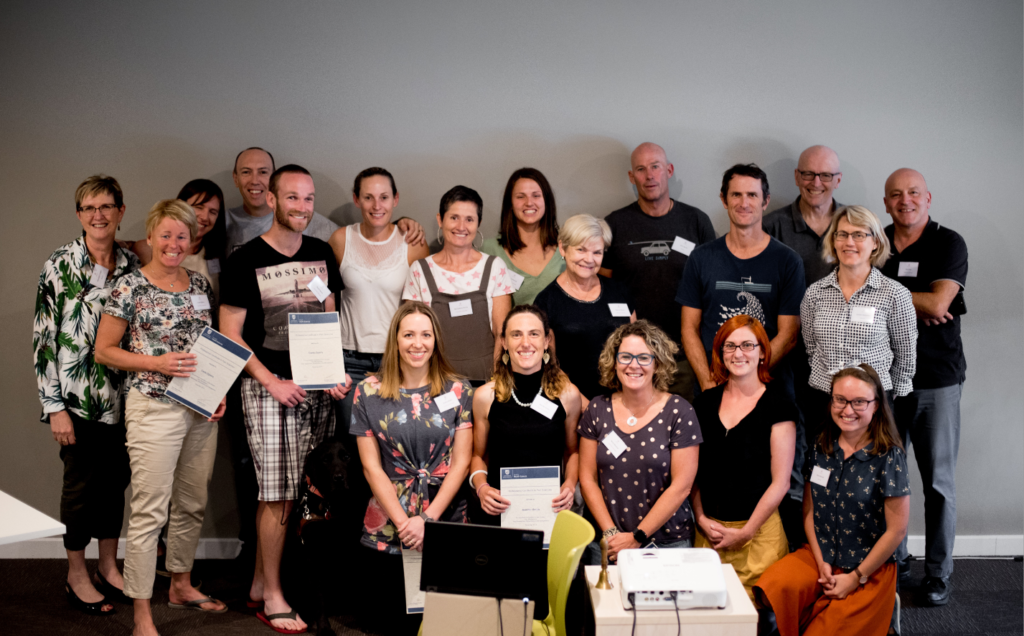
Pain science is an area with lots of interesting research and developments; new and effective approaches have been identified to prevent and manage persistent pain, placing emphasis on active approaches (movement and learning based) rather than passive ones (drugs, massage and surgery). These new self-management approaches can seem counter-intuitive amongst health professionals unless they have an understanding of contemporary pain science. International guidelines now universally recommend education as first-line treatment, but this is rarely delivered effectively as part of usual care.
The Pain Revolution determines where to target their efforts by assessing which rural and regional communities are flagged by the Australian Health Atlas as having excessive opioid prescriptions, back fusions and knee replacements. In response, the LPC program aims to upskill GPs and allied health professionals in best practise pain education and care within these communities, and establish a supported network amongst this difficult area of medical practice.
The Pain Revolution provided scholarships to twelve health professionals who live in regional communities across NSW/VIC. These individuals were trained to organise and deliver pain education events to the general public and other health professionals, and become clinical leaders and ‘champions for change’ within their community. Funding from the Enhancing Country Health Outcomes (ECHO) grant program enabled them to form a Local Pain Collective and deliver pain education in six regional areas of NSW: Wollongong, Nowra, Jindabyne, Cooma, Wagga Wagga and Albury/Wodonga.
Each Collective has delivered activities including pain education sessions, clinical support for knowledge to practice transfer, and a facilitated platform for peer-to-peer learning and resource sharing. A three-day workshop strengthened the network, bringing together the local pain educators, the reference group, content experts and facilitators, and monthly network meetings followed. The workshop also informed where skills could be developed, and this fed into the design and delivery of a monthly webinar series. Topics of direct relevance to the rural and regional context included understanding opioids, appraising evidence, facilitation skills, implementing behaviour change principles to pain care, and choosing words carefully when talking to pain patients.
In their application, Pain Revolution wrote that the project would deliver benefits on three levels. Of course it would benefit the rural and regional-based GPs and allied health professionals that participate. By improving pain education and care, it would also benefit the 1 in 5 rural Australians who suffer from persistent pain and the many more at risk of it because of a lack of up-to-date information and care.
The third level of benefit really speaks to the aims of the ECHO grant program:
“The extent to which persistent pain impacts entire communities – almost everyone is affected – means that this project will benefit entire communities by promoting informed self-management and resilience.”
FRRR is delighted to have been able to support this program, which is clearly making a difference to the lives of many rural people.
Grants of up to $150,000 available for Enhancing Country Health Outcomes
Bendigo, 5 May 2020: The Foundation for Rural and Regional Renewal (FRRR) is inviting not-for-profit organisations to apply for an Enhancing Country Health Outcomes (ECHO) grant to deliver initiatives that improve the health of people living in rural, regional and remote Victoria and New South Wales.
Rural communities face distinct challenges associated with distance and isolation, which place these regions at greater risk of poorer health management and outcomes than those living in metropolitan areas. In addition to these challenges, many parts of NSW and Victoria have been affected by drought, bushfires and now COVID-19, all of which have significant impacts on health care resources.
The ECHO grants program launched in 2018 thanks to a generous donation from Beyond Medical Education. The program offers targeted grants of between $50,000 and $150,000 for charitable initiatives delivered by not-for-profit organisations to strengthen, improve access to, and retain the quality of relevant and appropriate primary health care services in rural, regional and remote Victoria and NSW.
FRRR CEO, Natalie Egleton, says that basic health services, programs and equipment are vital to the sustainability of rural communities.
“Many of Victoria and New South Wales’ rural communities have limited access to appropriate primary health care. This has been compounded by the drought, bushfires, and now by the COVID-19 pandemic, and highlights the real need for communities to be able to attract resources and implement sustainable, best practice models that will see better health outcomes for local residents.
“Last year, we awarded $475,000 in grants through this program, and it’s great to see them making a real difference in the community. For example, Latrobe Community Health Service received a grant of $125,200 to implement the ‘Telkaya Project – Very Brief Advice For Behavioural Change’. Through this project, LCHS developed online training and support materials regarding lifestyle changes around smoking, nutrition, alcohol and physical activity. Staff are now able to integrate this intervention advice into their routine primary health care services.
“Mallacoota Community Health, Infrastructure and Resilience Fund, in Victoria, was another ECHO grant recipient, using $136,864 to help the local medical clinic get additional health services up and running. Patients can now access services including a general mental health program and Teen Clinic and a piloted nurse-led after-hours service, which has been particularly valuable given the impact of the fires,” said Ms Egleton.
Other types of rural and regional focussed projects that could be eligible include innovative primary health care training and leading-edge professional development to address an identified local need; measures to enhance the retention of primary health care services; or fostering local partnerships to develop better primary health care models. Full details and other examples are available in the program guidelines.
“The bushfires and COVID-19 have emphasised the real need for quality primary health services in rural and regional areas. Building strong and sustainable relationships that support the health of these communities is critical. It’s wonderful to be able to provide support for projects on the ground that foster this kind of long-term, health care provider collaboration,” said Ms Egleton.
Applications can be made via FRRR’s Grants Gateway, and close at 5pm AEST, 9 June 2020. Outcomes will be advised mid-August 2020.

